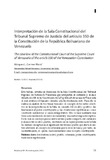Interpretación de la Sala Constitucional del Tribunal Supremo de Justicia del artículo 350 de la Constitución de la República Bolivariana de Venezuela

View/
Date
2014-05-08Author
Palabras Clave
Desobediencia civil, Pueblo, Soberanía, Poder constituyente, Tradiciones republicanasCivil dissobedience, People, Sovereignity, Constituent power, Republican traditions
Metadata
Show full item recordAbstract
Este trabajo, estudia las decisiones de la Sala Constitucional del Tribunal
Supremo de Justicia de Venezuela que interpretan el contenido y alcance
del artículo 350 de la Constitución de la República Bolivariana de Venezuela
el cual establece el llamado «derecho a la desobediencia civil». Para ello se
realiza un análisis de tres temas troncales: el concepto de los entes colectivos
en la jurisprudencia de la Sala, en concreto del vocablo «pueblo»; las
limitaciones al poder constituyente; y, las «tradiciones republicanas» como
constructo metateórico y canon interpretativo. Ello se hace mediante una
técnica de recolección de datos documental y una metodología descriptiva.
De lo cual se concluye que no existe criterio pacífico respecto del contenido
y alcance del vocablo «pueblo», existiendo así en la jurisprudencia de la Sala
un desfase conceptual en el significado del término pueblo que afecta el sentido
atribuido al concepto de soberanía que le sirve de base y por tanto, en
la identificación, el «quién» ha de entenderse como el sujeto constituyente.
Collections
Información Adicional
| Otros Títulos | The case law of the Constitucional Court of the Supreme Court of Venezuela of the article 350 of the Venezuelan Constitution |
| Correo Electrónico | cmarquez@uru.edu; carmenmariamarquezluzardo@gmail.com |
| ISSN | 1317-9535 |
| Resumen en otro Idioma | This paper studies the case law of the Constitutional Court of The Supreme Court of Venezuela which interpret the «right to rebelled» also called the «right of civil disobedience» establish in the article 350 of the Venezuelan constitution. For this purpose, we analyzed three main objects: the concept of the collectives bodies embedded in the constitution such as the concept of the expression «people»; the limitations of the constituent power; and the «republican traditions» as a metatheoric concept and interpretative canon. To do so, the research technique applied was a documental revew and the ideas were exposed by a descriptive method. The conclusions point to consider that there’s no cohesive doctrine in the case law of the Court related to the concept of the expression «people»; and this theoric problem affects the concept of sovereignty, and also, and more important, the identification of the constiuent power. |
| Colación | 55-92 |
| Institución | Universidad de Los Andes |
| Publicación Electrónica | Revista Provincia |
| Sección | Revista Provincia: Artículos |





